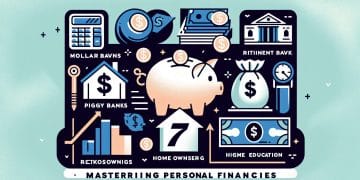Master Personal Finance: Essential Tips for Economic Freedom in America


Anúncios
**Title: Essential Personal Finance Tips for Americans to Save Big**
Managing personal finances can feel like navigating a complex maze without a map. However, don’t be discouraged. Achieving financial stability is possible with the right knowledge and strategies. Whether you’re striving to climb out of debt, build a strong safety net, or simply manage daily expenses more effectively, mastering personal finance unlocks a world of possibilities. This article will delve into essential strategies aimed at Americans, guiding them towards smarter spending and substantial savings.
Grasping control of your finances is more than just paying off debt—it’s about building a framework for a financially secure future. By implementing simple yet effective practices, you can lay the foundation for financial well-being. This journey begins with understanding and adjusting your budgeting habits to fit your lifestyle. The aim is to not only save money but also live a life free from financial stress. Through awareness and strategic planning, you can significantly improve your financial outlook.
Anúncios
Whether navigating unexpected expenses or investing in future goals, the key is consistent and informed decision-making. Personal finance doesn’t need to be overwhelming. With straightforward adjustments and a proactive mindset, you can turn your financial situation around. Tailored strategies can help achieve lasting stability and peace of mind. Ultimately, financial management is an ongoing process that requires dedication and patience, but the rewards—financial freedom and security—are undoubtedly worth the effort.
Overview of Personal Finance Strategies
The first step to financial well-being is to get a clear picture of your income and spending habits. Creating a budget is fundamental. Start by listing all income sources and comparing them to your expenses. Apps like Mint or YNAB can be helpful. Visualize where your money goes to identify areas that might need trimming, such as unnecessary subscriptions or impulse buys. These analyses help streamline expenses and keep finances in check.
Building an emergency fund is essential for handling unexpected costs without incurring debt. Aim to save enough to cover three to six months of living expenses. Although it might seem challenging, start with small goals—automate savings from your checking account to your emergency fund. Gradually, this buffer will grow, providing financial security during emergencies and cushioning against unforeseen financial hardships.
Anúncios
Saving intelligently requires adopting a disciplined approach, like the 50/30/20 rule. Allocate 50% of your budget for essentials, 30% for wants, and save 20%. This formula balances financial discipline with flexibility. Also, harness the power of compounded interest by investing in high-yield savings accounts. Over time, even small savings can grow significantly, building an increasingly substantial financial cushion.
Understanding your debt is crucial to managing it effectively. Distinguish between good debts, like mortgages that leverage long-term value, and bad debts, such as high-interest credit card balances that can become burdensome. Implement methods like the Snowball or Avalanche strategy to methodically pay off debts. With awareness and strategic repayment plans, alleviating debt is achievable and simplifies future financial endeavors.
Investing is not as complicated as it might seem. Many platforms enable starting with a minimal investment, making it accessible to everyone. Understanding retirement accounts like 401(k)s and IRAs is also crucial. Maximizing employer 401(k) matches can significantly enhance your retirement savings. Start investing early, and over time, these contributions will grow, creating a solid financial future.
Characteristics of Personal Finance Management
- Accurate budgeting to manage and scrutinize income and expenses.
- Consistent and automatic savings to build financial reserves.
- Strategic debt repayment to eliminate financial burdens.
- Regularly investing in retirement accounts and the stock market.
- Emphasis on adjusting habits to align with long-term financial goals.
Benefits of Effective Personal Finance Management
Efficient personal finance management yields multiple benefits. Firstly, it fosters increased financial security, providing peace of mind by mitigating unexpected costs. Secondly, responsible budgeting and saving create ample resources for emergency situations. Financial planning ensures resources are available even in times of economic uncertainty. Moreover, disciplined approaches to saving and investing plan for a comfortable, financially independent retirement.
Effective debt management and strategic repayments reduce the long-term financial burden, allowing individuals to focus on future asset building. Eliminating high-interest debts not only improves credit scores but also frees up income, enhancing spending flexibility. Cultivating responsible spending habits reduces the risk of falling back into debt cycles, facilitating sustainable financial wellness.
Smart investment strategies lay the groundwork for future financial growth. Leveraging compound interest and diverse portfolios maximizes the potential for long-term wealth accumulation. Engaging with investment markets, even minimally, familiarizes individuals with broader economic systems, enhancing financial literacy and confidence in managing personal finances. This engagement supports informed decision-making throughout their financial journey.
Finally, personal finance management creates a foundation for personal freedom and lifestyle choices. By controlling their financial narratives, individuals can make choices that align with their values and aspirations. Financial empowerment nurtures personal growth, facilitating opportunities for education, travel, and fulfilling experiences unhampered by monetary constraints.
Aligning personal finance management with personal goals builds a legacy of financial stewardship. Those who practice informed and proactive financial habits often pass them on to future generations, fostering family security and enduring financial literacy. This long-term mindset ensures that comprehensive financial planning benefits not just individuals but also their loved ones.
- Increased financial security and peace of mind.
- Ample emergency resources and risk mitigation.
- Timely debt repayment fostering financial freedom.
- Strategic investment for wealth accumulation.
- Personal empowerment and lifestyle freedom.





